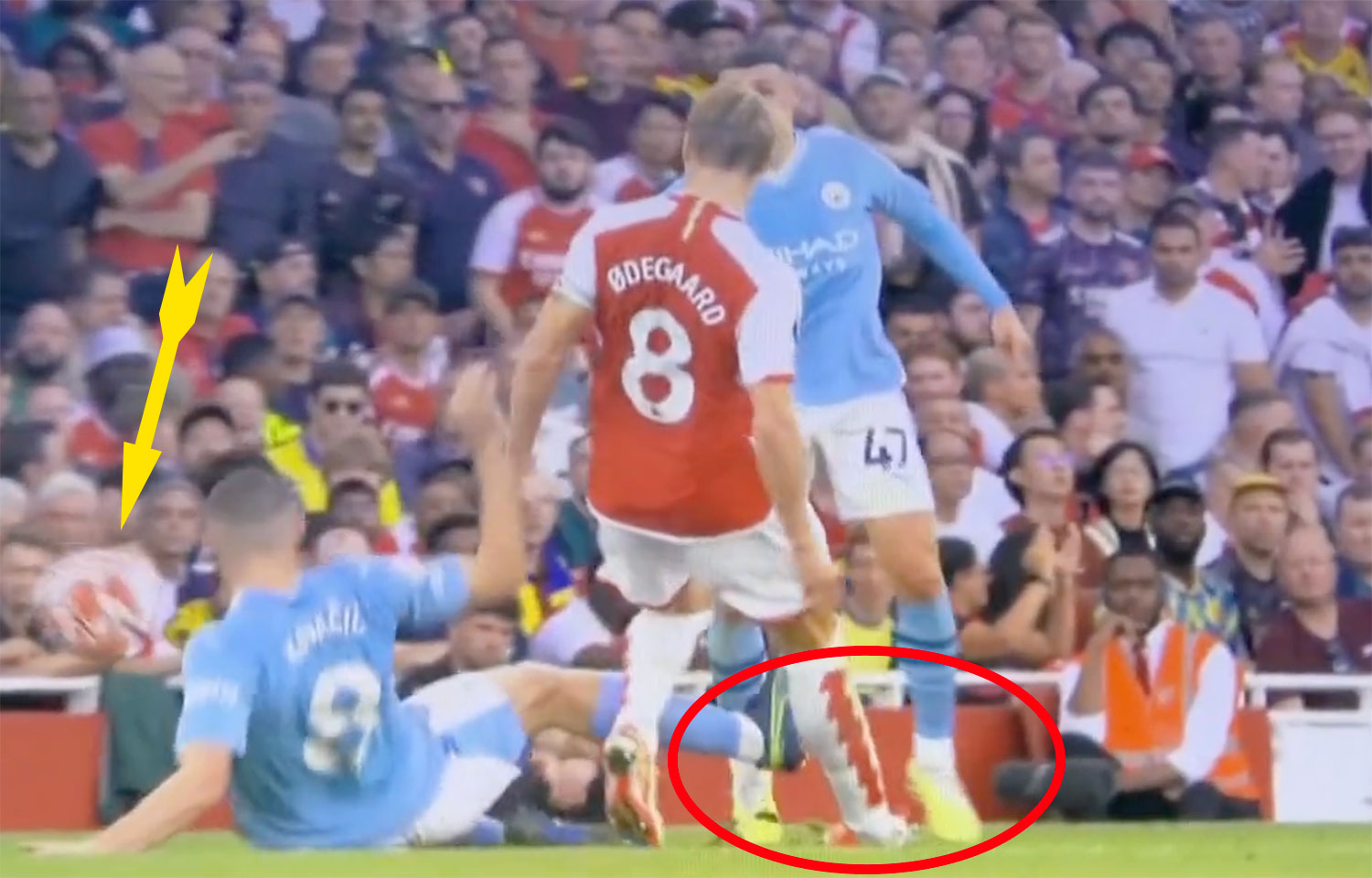Good morning.
I know refereeing and VAR talk leaves some people cold, but there’s not a lot else going on this morning, so let’s touch on Howard Webb as he continues his TV roadshow after another appearance with Michael Owen last night. The Beavis and Butthead of officiating and punditry review the decisions, and in this episode of the show nobody asked for, they discussed the Mateo Kovacic nonsense from Sunday.
Replays of the first challenge show that not only did Michael Oliver get it wrong, the VAR official is a essentially an idiot. To be fair, refs often can’t see things in real time that those with the benefit of videos can. Webb said:
I’m pretty confident if a red card had been given by Michael Oliver on the day it would have been a very straightforward check complete. But he doesn’t. He issues a yellow card.
Congratulations on stating the very obvious. He then goes on to explain the differences between recent tackles by Curtis Jones and Malo Gusto of Chelsea:
I think there’s a few differences. The player Kovacic comes into the tackle with the right leg. There’s some weight on the left leg as he kind of lunges in. The right heel hits the ground, and then the contact is a little bit more to the side with kind of like an upright foot as opposed to a side on foot that we saw with gusto a few small differences I think that led the VAR to feel that the on-field decision here of a yellow card wasn’t clearly and obviously incorrect and therefore check complete.
Which is a bit like saying the way a hitman pulled the trigger is the difference between one incident and another, even though both assassins iced their targets. Have a look at the image they showed. It’s blurry, but the key part is Odegaard’s ankle which has collapsed under the weight of the tackle.

The arrow, by the way, is where the ball is, demonstrating just how late it was. The Jones red card was not about the force of the tackle, it was about the consequence of it on the opponent – so I fail to see what is different here. I think we can all accept that a referee can miss something in real time, especially these days where the game moves so quickly, there’s no such excuse for a VAR. Especially one with a track record like John Brooks – from last season:
The VAR official who denied Brighton a goal against Crystal Palace on Saturday because he drew an offside line in the wrong place has been stood down from two Premier League fixtures.
That was same weekend that Brentford’s goal against Arsenal at the Emirates was allowed to stand because someone ‘forgot’ to draw the lines. Both incidents were then the subject of one of PGMOL’s litany of apologies.
“What about the second one?”, smirked Owen, in the clip of the show Tweeted out by Sky Sports. “I know we’re not going to show it, but do you think he was fortunate to stay on for the second yellow card a little bit later on?”
I mean, why not show it? If this is an exercise in transparency, surely there’s time for another clip – one you could easily show while Webb answers. We don’t need to see him the whole time, do we? His reply:
Obviously the VAR can’t get involved. Second yellows are something that the VAR is not able to get involved in, but I think he was an extremely fortunate player to stay on the field of play. Of course, the referee, one of our best referees, one of the best referees in the world, Michael Oliver will no doubt review that. He doesn’t want to have a negative impact on the game by overreacting to something. And sometimes players will be on a yellow card and then there’ll be pressure to show a second one. Pressure will come from the players on the field. But, you know, that’s also true that if you underreact, you have a negative impact on the game.
If you’re being extremely generous, and I mean that with a capital E, you could say that Oliver has taken stock of the moment he issued two yellow cards to Gabriel Martinelli in 8 seconds two seasons ago. He reflected on that and learned from it. I don’t believe that though. The job of the referee, as the insuffereable Mike Dean bleated at Paul Merson a few days ago, is to uphold the laws of the game. It’s up to the players to operate within those,a and for decisions to be made on that basis. It’s not up to the officials to decide the quality of the game is dependent on them.
Also, if we have to have VAR – and there’s no getting the genie back in the bottle at this stage – why can’t it look at incidents that could lead to a second yellow card? I mean, in this instance, the VAR probably would have advised a red card for Declan Rice for his ankle’s assault on Kovacic’s studs, but it doesn’t really make sense to me that we can’t do this. The Diogo Jota one in that infamous Liverpool game a few weeks ago is a great example of how play could continue, VAR could communicate that the first booking wasn’t worthy of a yellow card and the ref could have rescinded it there and then. If we can have five minute stoppages to see if a penalty is a penalty or not, why can’t we do it for second yellow decisions? It’s not as if there are twenty a game or something, so a few seconds to get the right decision is something we can cope with – whether that’s to send someone like Kovacic off, or Bruno Guimares against West Ham on Sunday, or save Tomiyasu against Crystal Palace.
That ref didn’t think about having a negative impact on the game when he gave Jota his second yellow for a silly challenge though, did he? So why is that on Oliver’s mind in this game? Is it because of the high profile nature of the fixture? Super Sunday and all the rest. Is it because been moonlighting in the UAE of late, and even subconsciously isn’t going to risk that extra income? Yes, I know that verges on territory that makes people uncomfortable, but it’s not as if we have zero experience – in society and the world we live on a daily basis, not just officiating – of how money can be a corrupting factor.
In as much as Kovacic was fortunate to escape a red card, I think Howard Webb is very fortunate that Arsenal won that game on Sunday. This abject attempt at post-hoc transparency is just a bit of a trick really. Look over here while we ignore the obvious: making the decision making process 100% public. Whether that’s live availability of the ref’s feed, or at the very least releasing it in full afterwards, the insistence on keeping it from fans whose clubs are being impacted by terrible decisions every week shows there’s no real desire to be properly open about this stuff.
Still, at least Howard Webb got to go on TV again. So there’s one winner in all of this.

